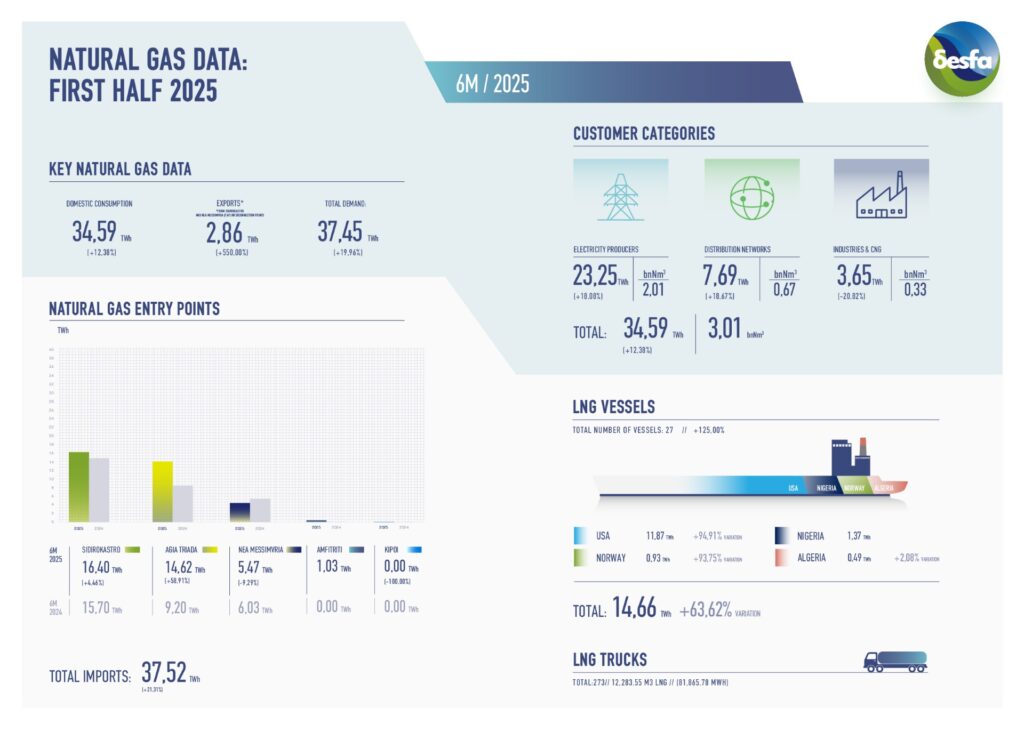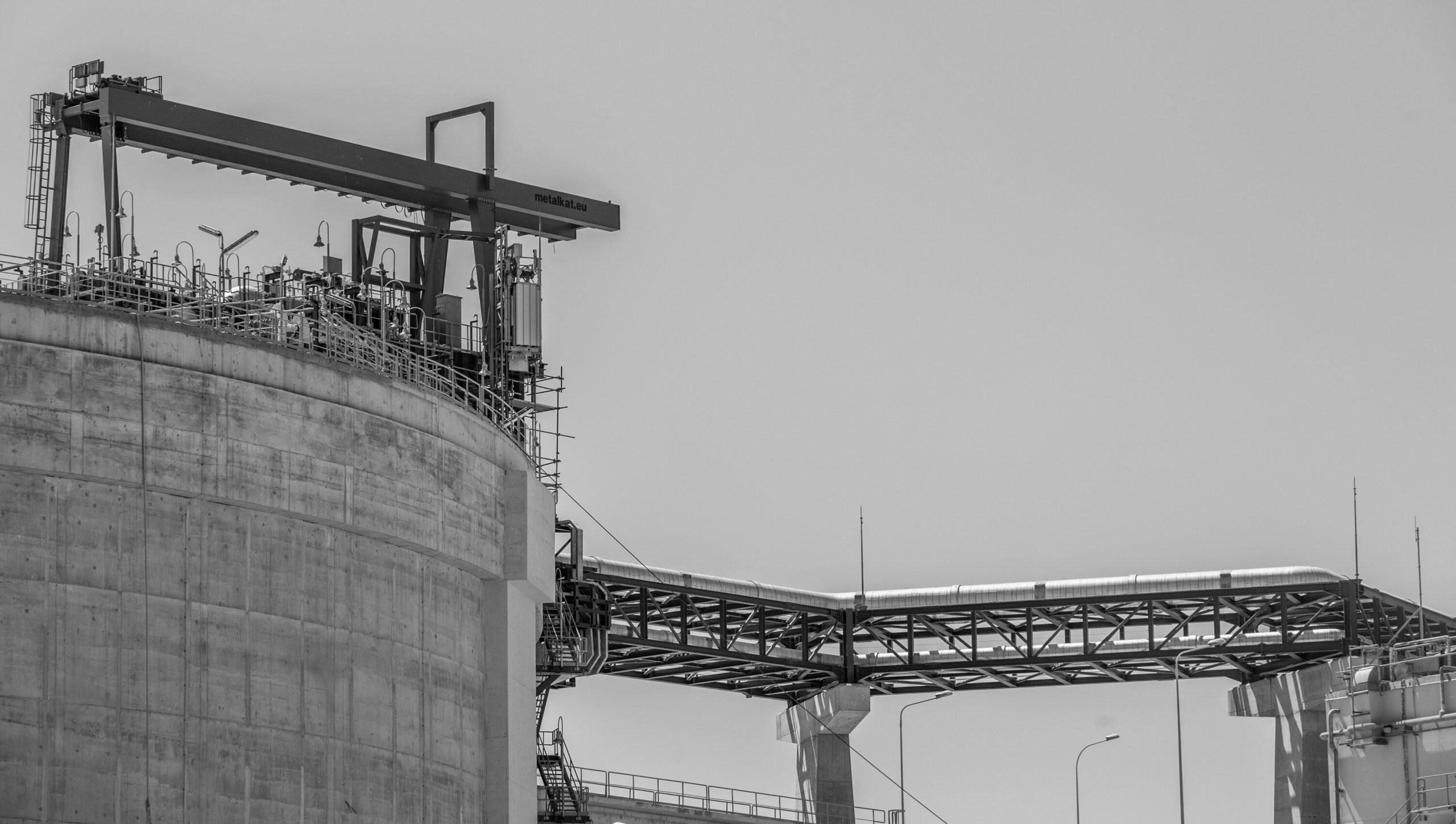- Increase in domestic natural gas consumption by 12.38% compared to the first half of 2024, with natural gas steadily strengthening its role in the energy mix.
- Power generation continues to drive the increase in natural gas consumption in the country, rising by 18.08% compared to the first half of 2024 and accounting for 67% of domestic demand.
- Boost in exports via the Sidirokastro and Nea Mesimvria interconnection points, reaching 2.86 TWh, up from 0.44 TWh during the same period in 2024 (+550%).
- Sidirokastro (16.40 TWh) and Revithoussa (14.62 TWh) remain the main natural gas entry points into the country, with the LNG Terminal receiving 27 LNG carriers in the first half of 2025, more than double the number from the same period last year.
- The LNG Truck Loading service continues its dynamic growth, with 273 LNG trucks loaded, compared to 104 trucks during the same period in 2024.
Athens, 9th July 2025- According to DESFA’s data for the first half of 2025, domestic natural gas consumption increased by 12.38%, reaching 34.59 TWh compared to 30.78 TWh during the same period in 2024, contributing to the stability of the Greek energy system and the further secure integration of renewable energy sources.
Specifically, during the period January–June 2025, total natural gas demand in Greece, including exports, reached 37.45 TWh, marking an increase of 19.96% compared to 31.22 TWh in the first half of 2024. Notably, natural gas exports through the Sidirokastro and Nea Mesimvria interconnection points rose significantly to 2.86 TWh, up from 0.44 TWh the previous year — an increase exceeding 550%.
In terms of consumer categories, power producers accounted for 67% of domestic demand, with 23.25 TWh, reflecting an 18.08% increase compared to 19.69 TWh in the first half of 2024. Consumption through distribution networks rose by 18.67%, reaching 7.69 TWh, while industrial users and CNG stations directly connected to the NNGS recorded a 20.82% decrease (3.65 TWh).
In the first half of 2025, Sidirokastro and Revithoussa remained the main natural gas entry points into Greece. Sidirokastro recorded imports of 16.40 TWh, marking a 4.46% increase compared to 2024, while the Revithoussa LNG Terminal (Agia Triada entry point) reinforced its pivotal role with a total of 14.62 TWh, representing a 58.91% year-on-year increase — despite being offline from April 22 to May 11 due to scheduled upgrade works.
More specifically, 27 LNG carriers were unloaded at the terminal during this period, compared to 12 in the same timeframe of 2024, delivering a total LNG quantity of 14.66 TWh, up 63.62% from 8.96 TWh in 2024. The United States remained the leading LNG supplier, with 11.87 TWh delivered, compared to 6.09 TWh in the first half of 2024. Nigeria followed with 1.37 TWh, Norway with 0.93 TWh, and Algeria with 0.49 TWh.
Regarding the remaining entry points, 5.47 TWh were imported via Nea Mesimvria (the interconnection point with the TAP pipeline), marking a 9.29% decrease compared to the same period last year. Through Amfitriti (the Alexandroupolis FSRU), a total of 1.03 TWh of LNG was imported until 22/1 when regasification services at the Station became temporarily unavailable.
Finally, DESFA’s LNG Truck Loading service at the Revithoussa Terminal continued to grow significantly, with 273 LNG trucks loaded in the first half of the year compared to 104 trucks in the same period of 2024, corresponding to 81.72 GWh of energy transferred, versus 30.72 GWh last year — an increase of approximately 166%. This sustained growth in truck loading activity confirms the service’s increasing recognition as an effective and flexible solution for meeting the energy needs of remote distribution networks and industrial consumers, both in Greece and the broader region.
DESFA’s infrastructure continues to play a key role in diversifying natural gas supply sources and enhancing security of supply. Furthermore, the liberalization of the energy market and the Third-Party Access (TPA) regime under which DESFA operates promote price competition. TPA is governed by European Union regulations and national legislation, ensuring open access to all interested parties.








